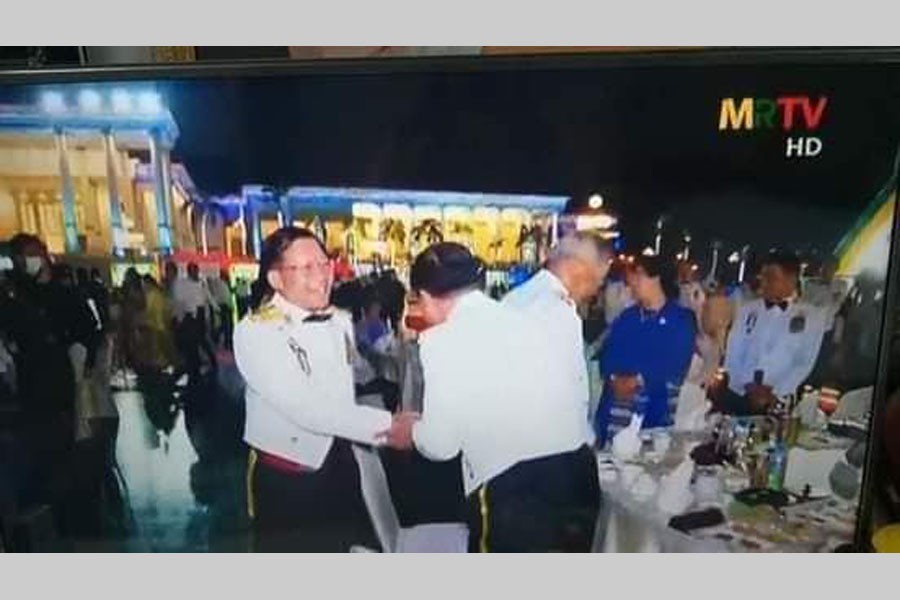The killing of more than 90 anti-coup protesters in Myanmar has drawn global outrage, with defence ministers of 12 nations condemning the military.
The US accused the security forces of a "reign of terror" on Saturday, the deadliest day since last month's coup.
Coup leader Min Aung Hlaing and his generals still threw a lavish party that night for Armed Forces Day.
On Sunday, funerals were held, with some reports the military had tried to intervene in the mourning.
More than 400 people have now been killed in the suppression of protests in Myanmar since the 1 February coup.
The military seized control of the South East Asian country after an election which Aung San Suu Kyi's National League for Democracy (NLD) party won by a landslide.
What has been the international response?
The defence chiefs of a dozen nations, including the UK, on Sunday issued a rare joint statement condemning the military's violent actions.
The US, Japan and Australia were also among the signatories of a statement that said: "A professional military follows international standards for conduct and is responsible for protecting - not harming - the people it serves."
The US said it was "horrified" by the killings. Secretary of State Antony Blinken accused the military of "sacrificing the lives of the people to serve the few."
UN Secretary-General Antonio Guterres said he was "deeply shocked" by the violence, and British Foreign Secretary Dominic Raab called it a "new low".
UN Special Rapporteur Tom Andrews called for an international emergency summit.
China and Russia have not joined the criticism, which means taking action through the UN Security Council - where they have vetoes - could be difficult.
What's the latest on the streets?
On Sunday, families held funerals for some of those killed the day before.
One was for Kyaw Win Maung, who was shot dead in Mandalay.
Another service in the city was held for Aye Ko, a father of four.
"We are told by the neighbours that Aye Ko was shot and thrown into the fire," one relative told AFP news agency. "He was the only one who fed the family, losing him is a great loss for the family."
Reports from Myanmar are difficult to confirm, but some local media said security forces had tried to intervene in funerals. Burmese-language outlet The Irrawaddy said police tried to arrest people at a service for a student union member killed in the town of Phaya-Gyi.
Protests are also reported to be continuing despite Saturday's crackdown, with rallies in towns including Katha and Hsipaw.
How has the military responded?
The military has not commented on the killings.
Early on Saturday it held a parade for Armed Forces Day and heard a speech from the coup leader Min Aung Hlaing, who said he wanted to "safeguard democracy" but also warned against "violent acts".
Representatives of Russia, China, India, Pakistan, Bangladesh, Vietnam, Laos and Thailand attended.
On Saturday evening a luxury military party was held in the capital Nay Pyi Taw, drawing an angry response from some on social media, including Burmese activist Maung Zarni.
“Dear World, We #Myanmar no longer call or view armed gangs led by Ma Aa La our Armed Forces. We call them Naypyidaw #Terrorists. Respect our overwhelming public's consensus view. At dinner parties these terrorists wear tuxedo” he wrote on twitter.
A number of Twitter posts placed pictures of the party alongside images of victims.
What happened on Saturday?
Anti-coup activists had called for peaceful protests but they soon turned violent as the security forces opened fire in more than 40 locations.
The commercial centre, Yangon, saw dozens of deaths, but killings were recorded from Kachin in the north to Taninthartharyi in the far south.
The Assistance Association for Political Prisoners (AAPP) monitoring group confirmed more than 90 deaths. Local news site Myanmar Now puts the death toll at 114, while the United Nations said it was receiving reports of "scores killed" and hundreds injured.
The director of the Burma Human Rights Network in UK told the BBC the military had shown it had "no limits, no principles".
"It's a massacre, it's not a crackdown anymore," Kyaw Win said.


